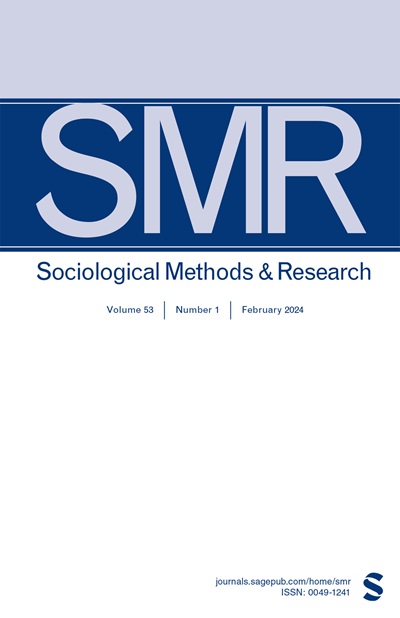社会流动作为因果干预
IF 6.5
2区 社会学
Q1 SOCIAL SCIENCES, MATHEMATICAL METHODS
引用次数: 0
摘要
流动效应研究是社会学的一个重要研究课题。然而,对个人流动效应的实证研究却受到一个基本限制的阻碍,即在原籍地和目的地不变的情况下,流动效应是不可识别的。鉴于这一基本限制,我们建议从微观到宏观层面重新认识流动效应。与以往文献主要关注的微观层面的流动效应不同,我们提出了有关宏观层面流动效应的其他研究问题:如果我们操纵流动制度,也就是说,如果我们改变观察到的社会原籍地和社会目的地之间的关联,结果的人口分布会发生什么变化?我们将个人层面的流动经验与特殊干预下的宏观流动效应联系起来。所提出的方法在社会分层研究的宏观和微观议程之间架起了一座桥梁,在流动效应研究之外的社会分层领域也有更广泛的应用。我们用两个分析来说明该方法,这两个分析评估了社会流动性对美国平均生育率和收入不平等的影响。我们提供了一个开源软件,即实现该方法的 R 软件包 socmob。本文章由计算机程序翻译,如有差异,请以英文原文为准。
Social Mobility as Causal Intervention
The study of mobility effects is an important subject of study in sociology. Empirical investigations of individual mobility effects, however, have been hindered by one fundamental limitation, the unidentifiability of mobility effects when origin and destination are held constant. Given this fundamental limitation, we propose to reconceptualize mobility effects from the micro- to macro-level. Instead of micro-level mobility effects, the primary focus of the past literature, we ask alternative research questions about macro-level mobility effects: What happens to the population distribution of an outcome if we manipulate the mobility regime, that is, if we alter the observed association between social origin and social destination? We relate individual-level mobility experience to macro-level mobility effects under special interventions. The proposed method bridges the macro and micro agendas in social stratification research, and has wider applications in social stratification beyond the study of mobility effects. We illustrate the method with two analyses that evaluate the impact of social mobility on average fertility and income inequality in the United States. We provide an open-source software, the R package socmob , that implements the method.
求助全文
通过发布文献求助,成功后即可免费获取论文全文。
去求助
来源期刊

Sociological Methods & Research
Multiple-
CiteScore
16.30
自引率
3.20%
发文量
40
期刊介绍:
Sociological Methods & Research is a quarterly journal devoted to sociology as a cumulative empirical science. The objectives of SMR are multiple, but emphasis is placed on articles that advance the understanding of the field through systematic presentations that clarify methodological problems and assist in ordering the known facts in an area. Review articles will be published, particularly those that emphasize a critical analysis of the status of the arts, but original presentations that are broadly based and provide new research will also be published. Intrinsically, SMR is viewed as substantive journal but one that is highly focused on the assessment of the scientific status of sociology. The scope is broad and flexible, and authors are invited to correspond with the editors about the appropriateness of their articles.
 求助内容:
求助内容: 应助结果提醒方式:
应助结果提醒方式:


